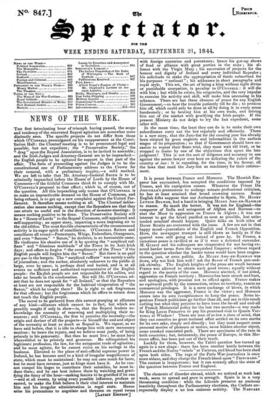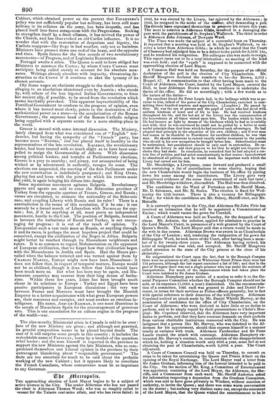The elements of disorder abroad, which we noticed at work
last week, seem to spread and grow in strength. Spain is in a very threatening condition : while the Liberals preserve an ominous inactivity throughout the Parliamentary elections, the Carlists un- expectedly display a no less ominous activity. The NAsvess
Cabinet, which obtained power on the pretext that ESPARTER0'13 policy was not sufficiently popular but military, has been still more
military in its reliance on the army, has been despotic, and has placed itself into fierce antagonism with the Progresistas. Seeking to strengthen itself by a fresh alliance, it has revived the power of placed itself into fierce antagonism with the Progresistas. Seeking to strengthen itself by a fresh alliance, it has revived the power of the Church, and has thus evoked an old Carlist influence. It is no wonder that with the restoration of despotism and bigotry, the Carlists reappear—like frogs in bad weather, only not so harmless. Ministers have pressed down one end of the beam, and the opposite end rises. Spain listens for the first sounds of two revolutionary movements—of Progress, and of Legitimist Restoration.
Portugal awaits a crisis. The Queen is said to have obliged her Ministers to summon the Cortes; by whom COSTA CABRAL must anticipate being called sternly to account for his absolute mea- sures. Writings already circulate with impunity, threatening de- struction to the Crown if it continue to abet the tyranny of its chosen servants.
Old Rome wages an obstinate struggle to the death with opinion, clinging to an absolutism abandoned even by Austria ; who stands by, with others of the less bigoted Italian Governments, to force her ancient ally, if possible, to be saved from the revolution which seems inevitably provoked. This apparent impracticability of the Pontifical Government to conform to the progress of opinion, even where it has moved most slowly, points to the destruction of the ecclesiastical power as a state—to the secularization of the Roman Government ; the supreme head of the Roman Catholic religion being supplied with a separate estate for a mere abiding-place in the world.
Greece is moved with some internal dissension. The Ministry, lately changed from what was considered one of "English " ten- dencies, but having the sympathy of the "French" party, has become more "Russian," and has placed itself in hostility to the representatives of the late revolution. KALERGI, the revolutionary leader, had been treated with so much slight as to have been com- pelled to resign the Governorship of Athens. With dissension among political leaders, and tumults at Parliamentary elections, Greece is a prey to anarchy; and piracy, not unsuspected of being winked at by adventurers in authority, ravages its coast. The elections are suspended, the meeting of the first Parliament under the new constitution is indefinitely postponed ; and King OTHO, playing fast and loose with the power to which his terrors made him yield, is again bringing his throne into danger. Some mysterious movement agitates Bulgaria. Revolutionary papers and agents are said to enter the Sclavonian province of Turkey from the opposite quarters of France, Greece, and Russia ; verses are circulated, to animate the nationality of the Sclavonic race, and coupling Liberty with Russia and its ruler ! There is a contradiction in the terms of this revolution, if it be one : it can scarcely be a forced march of Liberalism with NICHOLAS for cap- tain ; but, if it be anything at all, must prove an independent movement, hostile to the Czar. The position of Bulgaria, hemmed in between the barbarisms of Russia and Turkey, is not encou- raging for progress : it is out of the reach of opinion. To Europeanize such a vast rude mass as Russia, or anything through it and its races, is perhaps the most hopeless project that could be conceived, except the civilization of the Negro in Africa. Bulgaria might better be reached through its Mussulman neighbours and rulers. It is so common to regard Mahometanism as the opponent of European civilization, that we forget bow that civilization began with the Mussulmans in Arabia and Spain. Had the Moors pre- vailed when the balance tottered and was turned against them by CHARLES MARTEL, Europe might now have been Mussulman : it does not follow that, in respect of temporal matters, Europe would not be as civilized, though it does follow that Islam would have been much more so. But what has been may be again, and Ma- hometan countries may recover from their long dream of barba- rism. Within these few years, Islam has been brought much closer in its relations to Europe : Turkey and Egypt have been passive participators in European discussions : the very war between France and Morocco must have brought the Moorish Emperor to a better acquaintance with what great European powers are, their resources and energies, and must awaken an emulous in- telligence. His name, ABD-ER-RAHMAN, is one most illustrious in the annals of Mussulman Spain for the encouragement of generous arts. This is one consolation for an odious engine in the progress of the world—war.



























